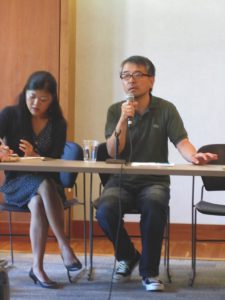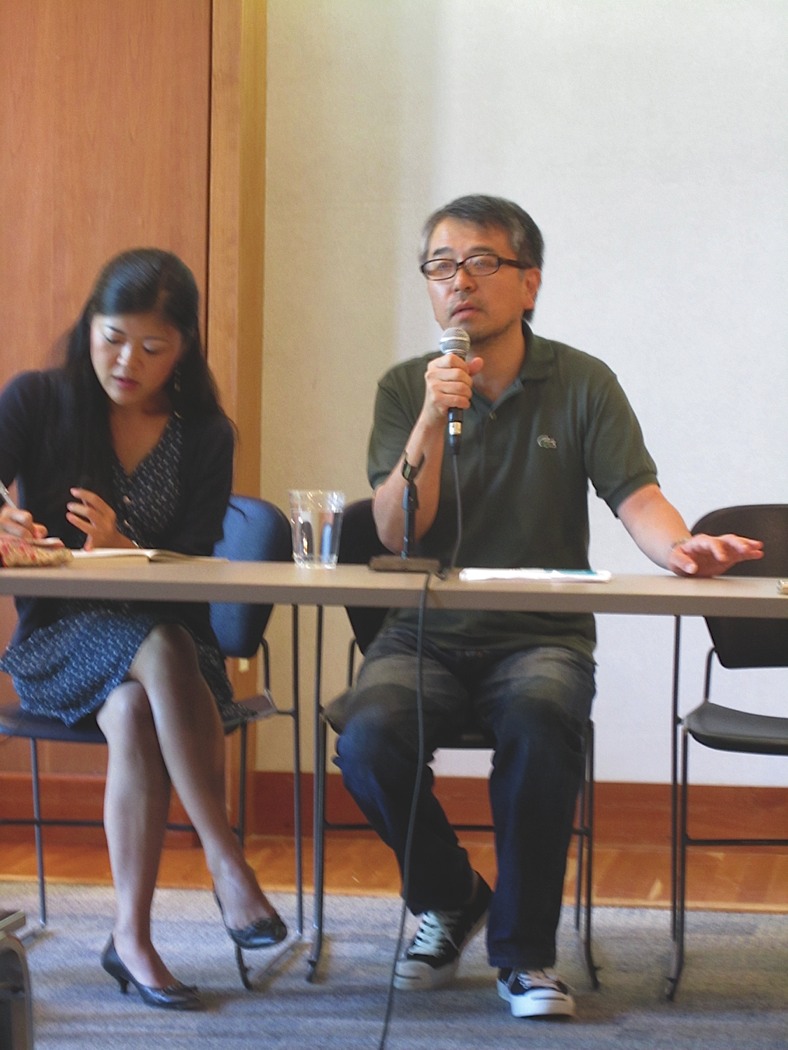Ernest Reid
Science & Technology Editor
Last week, second-year humanities students met leading figures of the Japanese literary community, and learned the difficulty of being a haiku poet in post-Fukushima Japan.

They attended the on-campus launch of Monkey Business, the first English edition of the Japanese literary magazine. Their professor, Ted Goossen, is a translator and critic of Japanese literature. He worked with fellow critic and translator Motoyuki Shibata to bring the literary magazine to North American shores.
Attendees at the launch heard readings from novelists Hideo Furukawa, Hiromi Kawakami, and haiku poet Minoru Ozawa.
Shibata introduces Ozawa to Dr. Goossen’s students.
“Some of the haiku poets or tanka poets intimidate you with their erudition,” he says, “but Mr. Osawa’s kind of haiku is not intimidating, so please don’t worry.”
As a great fan of pianist Glenn Gould, Ozawa was very happy to be in Toronto.
“I’ve always been strengthened by his strong yet pure performance,” Ozawa says through an interpreter. In his work as a haiku poet, he always wanted to attain “the same level of lightness and purity and definitiveness of Gould’s interpretations.”
Writing about ghosts for the English issue of Monkey Business was a hard topic for Ozawa.
“In haiku, there is a rule that you must put in a seasonal word in a single poem,” he says, “but ‘ghost’ is not a seasonal word.”
He read eight poems during the reading: six about ghosts, two about Fukushima. His second poem, “From the black depths / of the toilet bowl / a ghost emerges,” stood out. Toilets are often scary for children, he explains. As a child, he would imagine someone’s ghostly hand emerging from the bowl.
Ozawa’s readings explore the relation between the haiku and the ghost.
“Haiku is a collaboration between the dead and the living,” he says. The living poet uses the language created by the dead and that process of collaboration is what haiku is. “Haiku, perhaps is something like a ghost,” Ozawa muses.
His last two poems were about Fukushima. The events of Fukushima, both the earthquake and the nuclear disaster, challenged his poetics. Ozawa believes “the haiku poet always depicts the wealth of nature,” but seeing the violent images of nature in the aftermath of the quake contradicted this philosophy.
“There was this period [after the quake] where I couldn’t write poems at all,” Ozawa admits, but he was asked by a poetry journal to write an encouraging work for the victims of Fukushima. “Cherry blossoms / will bloom again / in harbours up north” was the haiku he composed for them.
The second Fukushima haiku read was “The Master said / beauty in all things, / but Plutonium? I ask.”
The Master, Ozawa explained,
is Matsuo Bash?, a 17th-century poet.
“One of the philosophies of haiku articulated by Bash?, [is] that one must find beauty in all things and all states,” he says. Ozawa had difficulty thinking about Fukushima in terms of Bash?’s philosophy.
He considered what the Master might have meant by “all things”. Ozawa believes he means transient and impermanent things: “so plutonium, which lasts for billions of years, has to be excluded from the realm of beauty.”
As Ozawa poses this question to Bash? across time, he says, “I want him to agree that plutonium is not beautiful.”
“The haiku has a 400-year history,” Ozawa points out, “and Japan was hit by an earthquake said to be once every 1,000 years. I think it’s inevitable that the haiku has to face, to combat, something even greater.”
After Fukushima, the haiku community—and the rest of Japan—faces difficult questions. The haiku poet has a duty to face the problems posed by the disasters head-on.
“I can’t continue writing haiku without facing [them],” Ozawa admits. “It’s something that can’t be ignored, especially by the haiku poet.”
Poetry translated by Ted Goossen and Motoyuki Shibata.


